Tag Archives: Atlantic States Marine Fisheries Commission
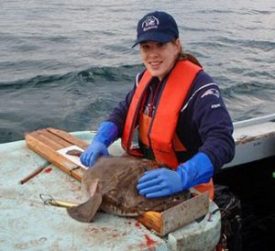
At-Sea Monitoring 2019 Coverage Levels and Reimbursement for Groundfish Sector Fishery
NOAA Fisheries announces that for fishing year 2019 the total target at-sea monitoring coverage level is 31 percent of all groundfish sector trips. Additionally, for fishing year 2019, NOAA Fisheries will continue to reimburse 100 percent of industry’s at-sea monitoring costs. In 2018 and 2019, we received Congressional appropriations that have been and will continue to be used to reimburse sectors for 100 percent of their ASM costs. This reimbursement will continue at 100 percent for the 2019 fishing year. As in past years, the Atlantic States Marine Fisheries Commission will administer the reimbursement. For more information, >click to read<15:44

MAINE DMR schedules whale updates, community meetings
Maine’s $485-million lobster industry is facing serious restrictions on the way it operates as a consequence of efforts to protect endangered right whales from extinction. In April, DMR will hold a series of community meetings to talk with lobster industry members about upcoming actions by the NOAA Fisheries Atlantic Large Whale Take Reduction Team and the Atlantic States Marine Fisheries Commission dealing with protection issues. Meetings are scheduled for >click to read<14:28

Impending whale protections worry fishermen
With the majority of American lobsters caught in Maine, the state’s lobster fishermen could bear the brunt of changes in federal fishery regulations to save the endangered right whale. At the March 1 Fisherman’s Forum update on the threat of extinction for the North Atlantic right whale, it became clear regulators believe changes to fishing gear will be announced sometime this year. Right whale presentation – National Oceanic and Atmospheric Administration official Mike Asaro explained that most of the remaining 450 North Atlantic right whales are male, with a population of about 100 females,,,. >click to read<16:17
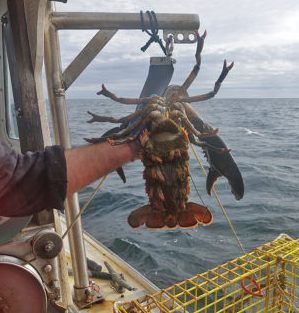
Efforts Underway to Reduce Lobster Fishing Gear to Help Rare Whale
Interstate fishing managers are starting the process of trying to reduce the amount of lobster fishing gear off the East Coast in an attempt to help save a declining species of rare whale. The Atlantic States Marine Fisheries Commission announced this month that it would consider options designed to reduce vertical lobster fishing lines in the water by as much as 40 percent. The commission said it would try to reduce the amount of gear with a combination of trap limits, seasonal closures, changes to gear configuration and other methods. The rules are under development and it will take months before they come up for public hearings. >click to read<10:45
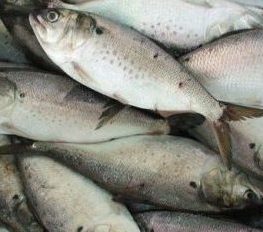
Virginia escapes sanction — for now — that could shut down menhaden fishing
A threat to shut down Virginia’s menhaden fishery disappeared after an interstate commission decided it wouldn’t find the state out of a compliance with a new quota for the oily fish. The Atlantic States Marine Fisheries Commission cut the quota for menhaden caught in Chesapeake Bay by purse-seine vessels by 42 percent back in 2017 — but the General Assembly balked this year and last at enacting that lower quota into state law. This month, the commission indefinitely postponed taking any action to find Virginia out of compliance, a finding that could trigger a federal moratorium on the fishery. >click to read<10:51
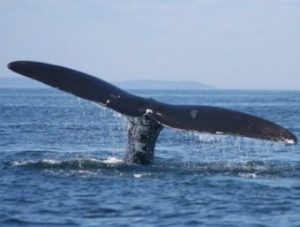
Lobstermen face more gear restrictions to protect whales
Nearly everywhere but up inside Maine’s many bays, fisheries regulators have forced lobstermen to use sinking rather than floating rope for the groundlines that connect traps on the sea bottom, to limit the number of traps set on a trawl to reduce the number of vertical buoy lines in the water and to install “weak links” in those vertical lines so an entangled whale can break loose. All those mandates, which arose out of discussions at NOAA’s Atlantic Large Whale Take Reduction Team (ALWTRT), were hard-fought, expensive and largely unpopular. >click to read<11:22

New drive to reduce lobster fishing gear to help rare whale
Interstate fishing managers are starting the process of trying to reduce the amount of lobster fishing gear off the East Coast in an attempt to help save a declining species of rare whale. The Atlantic States Marine Fisheries Commission announced on Wednesday that it would consider options designed to reduce vertical lobster fishing lines in the water by as much as 40 percent. >click to read<13:48
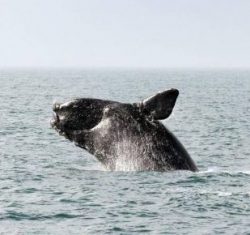
Atlantic Lobster Board Moves Toward Reducing Rope In Effort To Save Right Whales
A consortium of Atlantic states fisheries managers is calling for broad changes to the gear lobstermen use, in an effort to reduce risks posed to the endangered North Atlantic right whale and to ward off potential federal action that could be even more challenging for the industry. At a meeting of the Atlantic States Marine Fisheries Council in Virginia, its lobster board voted unanimously to set in motion the process that could lead to major changes in the East Coast’s lobster industry. >click to read<12:43
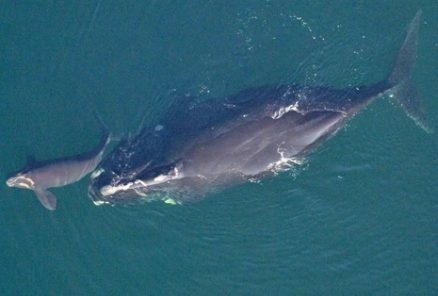
‘Lobster-Whale Work Group’ Faces Complicated Balancing Act As It Works To Protect Right Whales
Under pressure from lawsuits and the requirements of the federal Endangered Species Act, the federal government is closely reviewing the health of the right whale population, which is hovering around 410 animals. The result could be the imposition of new gear and other restrictions to reduce the risk of whale entanglement with the rope lobstermen use to position and haul their traps,,, a new “Lobster-Whale Work Group,” made up of state officials in the Atlantic States Marine Fisheries Commission, has proposed a slate of possible actions with the dual goals of protecting the whales and the “viability and culture of the lobster fishery.” “We’re doing everything we can to appease the people who think it may be us,” says Stephen Train, a lobsterman in Long Island, Maine. >click to read<11:50

Whale rule changes coming on two tracks
Maine lobstermen and their representatives, along with state fisheries regulators, continue in the trenches of debates about how much the Maine lobster fishery is implicated in the decline of the North Atlantic right whale. Ongoing efforts to protect the whales from entanglement with fishing gear may result in two different new sets of regulations, Sarah Cotnoir, resource coordinator for the Maine Department of Marine Resources, and Patrice McCarron, executive director of the Maine Lobstermen’s Association, told the Zone B Council last week. >click to read<11:03

Walter Kumiega reflects on eight years in the House
Deer Isle carpenter Walter Kumiega represented District 134—Deer Isle, Stonington, Isle au Haut and eight other communities—for eight years in the state legislature before becoming ineligible for re-election under state term limits for legislators.,, With commercial fishing communities “still the most important economic driver in my district,” Kumiega immediately joined the Joint Standing Committee on Marine Resources, chairing it for his final three terms. Throughout his tenure, he worked to initiate changes in lobster licensing regulations and sponsored legislation creating the Maine Lobster Marketing Collaborative, funding for which was recently renewed for a second three-year span. >click to read<15:07
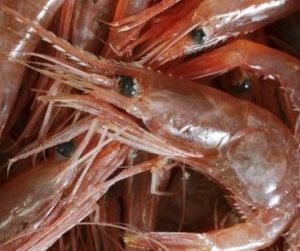
ASMFC block Northern shrimp harvesting for 3 more years
Citing continuing concerns that further fishing could drive the species to extinction, the Atlantic States Marine Fisheries Commission voted Friday to cancel not only the 2019 Maine shrimp season, but the 2020 and 2021 seasons as well. Commissioners from New Hampshire and Massachusetts supported the closure, while Patrick Keliher, commissioner of the Maine Department of Marine Resources, voted no, according to Tina Berger of the commission. DMR spokesman Jeff Nichols said in an email that Keliher would have supported a one-year moratorium. >click to read<17:59
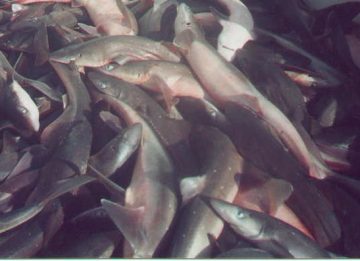
Dogfish population declines off East Coast, as will the harvest
A small species of shark that is fished for food off the East Coast has declined slightly in population, and fishermen will be allowed to catch slightly less of it in the coming year. Spiny dogfish are harvested off several Atlantic states, and they are especially popular in Europe. The Atlantic States Marine Fisheries Commission says a recent assessment of the shark’s population shows a decline in the number of spiny dogfish. >click to read<10:13
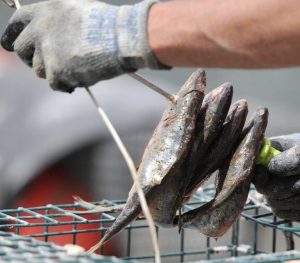
Regulators moving to ban exotic bait that could threaten lobster fishery
The American Lobster Management Board took a first step toward adopting regional bait safety rules, voting Monday to develop a resolution to prohibit the use of exotic baits that could introduce disease, parasites or invasive species to East Coast waters.,, The board – which is part of the Atlantic States Marine Fisheries Commission – agreed to develop a bait safety resolution based on Maine’s rules that all lobstering states would enact by 2020 – a quick but voluntary fix. >click to read<09:36
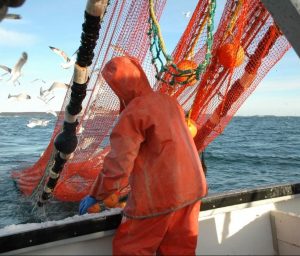
Northern Shrimp: Regulators set hearing on shrimp rules
Meeting in Portland earlier this month, the ASMFC’s Northern Shrimp Section approved, subject to public comment, an “addendum” to the current version of the Northern Shrimp Fishery Management Plan. The addendum would allow each of the three states that have shrimp landings — primarily Maine but also New Hampshire and Massachusetts — to allocate their annual catch quotas between the types of gear used in the fishery. The ASMFC will take written comments on the rule until Wednesday, Nov. 7. >click to read<11:46
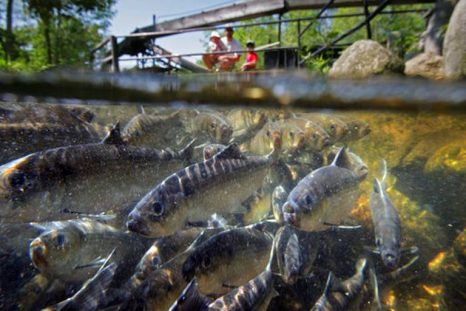
Habitat: River Herring, key to coastal health, slowly returning to rivers
A little fish on the East Coast that once provided vital protein for American colonists and bait for generations of New England lobstermen is slowly making a comeback after falling victim to lost habitat and environmental degradation. River herring once appeared headed to the endangered species list, but they’re now starting to turn up in rivers and streams at a rate that fishing regulators say is encouraging. The fish is a critical piece of the ecosystem in the eastern states, where it serves as food for birds and larger fish. >click to read<14:06
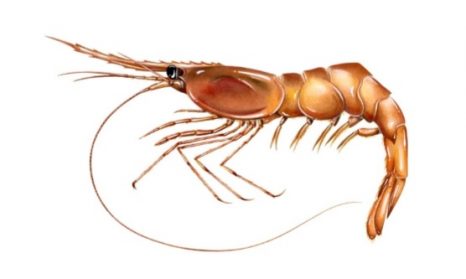
Northern Shrimp: Maine fishermen demand better science before canceling another shrimp season
Members of the Atlantic States Marine Fisheries Commission will meet Thursday in Portland to review the most recent stock assessment and make recommendations on whether Maine will see a shrimp season next year for the first time since 2013.“Spawning stock biomass and total abundance remain low, with little sign of recovery,” Toni Kerns, an ASMFC fishery management plans coordinator, wrote in an email about the shrimp population in the Gulf of Maine.,, But Maine’s shrimp fishermen, facing a sixth consecutive barren season, are calling the survey process by the ASMFC a “sham” and say the entire process to measure the recovery of Maine shrimp should be overhauled. >click to read<08:37
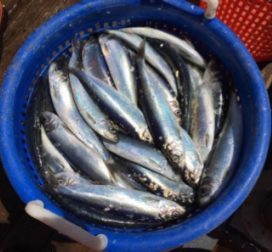
Atlantic herring quotas may be cut again
Later this month, fisheries regulators will decide whether to adopt a new set of regulations, known as Amendment 8, that could include restricting fishing areas for the herring and could, for the first time, account for the fish’s place in the larger ecosystem. The New England Fishery Management Council’s Atlantic herring committee will meet next week to vote on a recommendation to the full council, which meets the following week. Consideration of the new management system, and the restrictions it would bring, follows the announcement in August that next year’s quota for Atlantic herring had been cut by 55 percent from its original level. >click to read<16:06
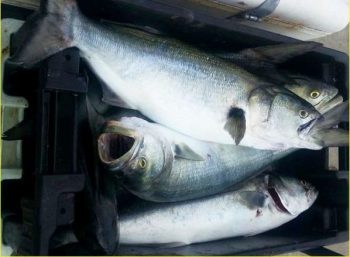
Have bluefish changed their habits?
What is causing them to change their behavior is puzzling fishermen and federal fishery managers who appear to have hit a wall trying to figure out the best way to utilize the fish. By all indications the numbers of bluefish up and down the East Coast are not scarce, they’re just not where they’re expected to be. “There’s an abundance of them. They’re just 80 to 100 miles offshore where the longliners can’t keep them off the hook,” said Captain Lenny Elich, who runs the Miss Barnegat Light party boat. The two federal regional bodies that manage bluefish want to revise the allocation of bluefish between commercial and recreational fisheries by taking as much as 4 million pounds from the recreational harvest and giving it to commercial fishermen. >click to read<14:26

New England shrimp population still looks bad amid shutdown
A new analysis of New England’s shrimp population doesn’t bode well for the future of the long-shuttered fishery for the crustaceans. The Maine-based shrimp fishery has been shut down since 2013 because of concerns such as warming ocean temperatures and poor survival of young. Scientists working with the Atlantic States Marine Fisheries Commission are assessing the shrimp stock, and so far it looks like little has changed. Results of the stock assessment “look fairly similar to what we’ve seen in previous years,” said Megan Ware, a fishery management plan coordinator with the Atlantic States. >click to read<08:54
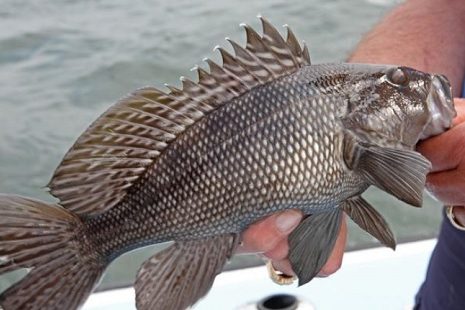
Black sea bass surge off R.I.
Scientists tell us that some fish will be winners and others losers as oceans warm. In Rhode Island, count lobster, silver hake and winter flounder among the losers, their numbers plummeting as climate change drives water temperatures higher. On the list of winners so far are squid, summer flounder, butterfish. And black sea bass. The population of the dusky-colored fish with striking blue accents has historically been strongest off the mid-Atlantic Coast, but over the past decade or so its numbers have spiked off New England and it is becoming a more important catch for the region’s fishermen. How they are managed will have important implications not only for those fish but for lobsters and other key species in the ocean ecosystem. >click to read<12:30

A Political Fish Tale That Could Bait Trump
A fish story isn’t one without a bit of exaggeration. Consider menhaden: A bony, little fish used for bait and to make fertilizer, animal feed, dietary supplements and lipstick, it is vital to marine ecology as a bottom-of-the-food-chain staple for other creatures, finned and winged, and as an oceanic janitor, scrubbing waters clean of algae. And menhaden is the protagonist in an economic and political tale that could lead to a confrontation between President Trump and the state that denied him a sweep of the South in 2016: Virginia.,,, And this fish story includes a little-noticed and rare breach between Gov. Ralph Northam and his predecessor, fellow Democrat Terry McAuliffe,,, Racing to the exits, McAuliffe, whose political action committee received $15,000 from Omega in 2017, initiated an appeal to the Atlantic States Marine Fisheries Commission to forgo the new restriction. >click to read<12:24
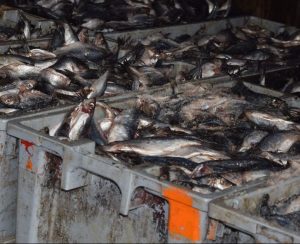
The cost of herring – Fishermen feeling bait price squeeze
“We made no money this spring,” said Bass Harbor fisherman Justin Sprague. The cost of operations for lobstering continues to increase while the boat price of lobster has hardly budged. The cost of herring, the preferred bait for most Maine lobsterman, has gone up especially sharply. “We don’t have any margin at this point,” Sprague said. “It’s frustrating, to say the least.” Bruce Colbeth manages the C.H. Rich lobster wharf in Bass Harbor. “By the time these guys pay for fuel, bait and stern men, there ain’t too much left for them,” he said. “I remember six years ago you could sell (herring) bait for $26 a bushel. Now it’s doubled.” >click to read<11:41
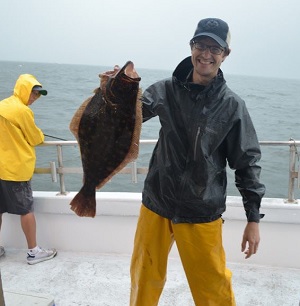
Climate change moving fish north, threatening turf wars, study says
World conflict is likely to increase over access to fisheries, as species move north in response to a warming ocean, according to a Rutgers University study published last week in the journal Science. “Seventy or more countries will likely have to start sharing with their neighbors” in coming decades, said lead author Malin Pinsky, including the U.S., Canada and Mexico.,, Gregory DiDomenico, executive director of the Garden State Seafood Association, said northern states such as New York argue they should now get a larger allotment for their fishing industries. He said allotments, which are set by the Atlantic States Marine Fisheries Commission and the Mid-Atlantic Fishery Management Council, are based on the history of landings by state. >click to read<23:32
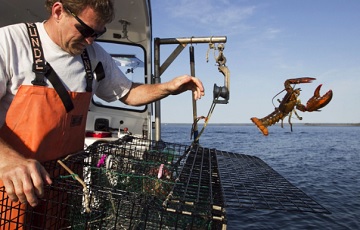
Feds weigh costly new regulation for Maine lobstermen
The National Oceanic and Atmospheric Administration requested comment on the proposal in a notice posted to the Federal Register on Wednesday. Maine is the only state that doesn’t require all lobstermen to report catch-level information after each haul, and the policy change is expected to receive backlash from its powerful fishery lobby. “We’re going to get a lot of probably negative comments on this because it’s going to be a burden for people,” said Peter Burns, a lobster policy analyst with NOAA’s Greater Atlantic Regional Fisheries Office. “The lobster industry is very strong. For the longest time, they wanted to protect their fishing information, their proprietary business information.” >click to read<09:15
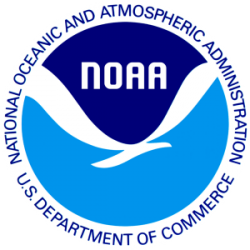
NOAA Fisheries Seeks Comments on Future Reporting Requirements for the American Lobster Fishery
The Atlantic States Marine Fisheries Commission recently approved Addendum XXVI to Amendment 3 of the Interstate Fisheries Management Plan for American Lobster to improve the scope and type of data collected in the lobster fishery in order to improve stock assessments, assess potential impacts of wind farms, and better assess interactions with marine mammals. The addendum includes recommendations to: Require all federal lobster permit holders to report on catches for each fishing trip. Have NOAA Fisheries collect data on where, when, and how long fishermen are fishing. Expand NOAA Fisheries’ offshore biological sampling program. >click to read<17:07

Scientists say Maine’s lobster boom won’t last. Here are the fisheries coming next
In southern New England, many fishermen have turned their attention to species such as Jonah crab and black sea bass, the numbers of which have increased as ocean temperatures warm and as lobster in the region have become more scarce. Maine’s lobster landings remain near historic highs, but some say the changes that have occurred south of Cape Cod are inevitable in the Gulf of Maine. “I know it’s a hard concept to get around, but it’s going to happen,” Norbert Stamps, a Rhode Island fisherman, told a roomful of other fishermen at the Maine Fishermen’s Forum in Rockport in March. “It seems as the lobster declined [in southern New England], the crab increased. And sea bass are everywhere.” >click to read<10:43
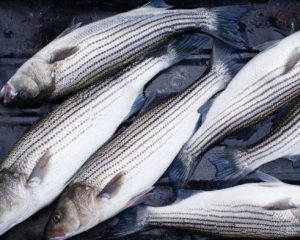
Proposal for tighter oversight of recreational striped bass catch dies
Commercial fishermen asked state regulators Tuesday night to make recreational fishermen tag their striped bass the way commercial operators do, to make sure they’re not taking too many fish. But the idea died when Doug Jenkins, president of the Twin Rivers Watermen’s group, in Warsaw, outlined his proposal to the Virginia Marine Resources Commission’s finfish management advisory committee. “We’re losing our rockfish (striped bass) quota and losing our crab industry,” Jenkins told the committee. >click to read< 18:32

LI fishermen object to black sea bass quota deal
Fishermen critical of a recent deal to ease black-sea bass regulations demanded further state action at a fisheries meeting Tuesday, but officials said the interstate agreement was the best they could get this year. Around a dozen angry party- and charter-boat captains attended a meeting of the Marine Resources Advisory Council in Setauket Tuesday night to raise objections to the deal, which effectively nixed a planned 12 percent reduction in the state’s recreational black sea bass quota this year. They and a supporting lawmaker cited a more lenient quota for competing New Jersey fishermen, saying anglers would favor the Garden State given its earlier season open and ability to keep more fish at a smaller size. >click to read<15:20




































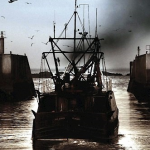

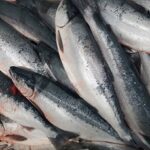





MAFMC/ASMFC Public Hearings on Summer Flounder Commercial Issues Amendment
The Mid-Atlantic Fishery Management Council and Atlantic States Marine Fisheries Commission are seeking public input on a draft amendment to address several potential changes to the management of the commercial summer flounder (fluke) fishery, as well as modifications to the fishery management plan (FMP) goals and objectives for summer flounder. Ten public hearings will be held between September 10 and September 27. Written comments will be accepted through October 12, 2018. >click to read<19:25
Share this post